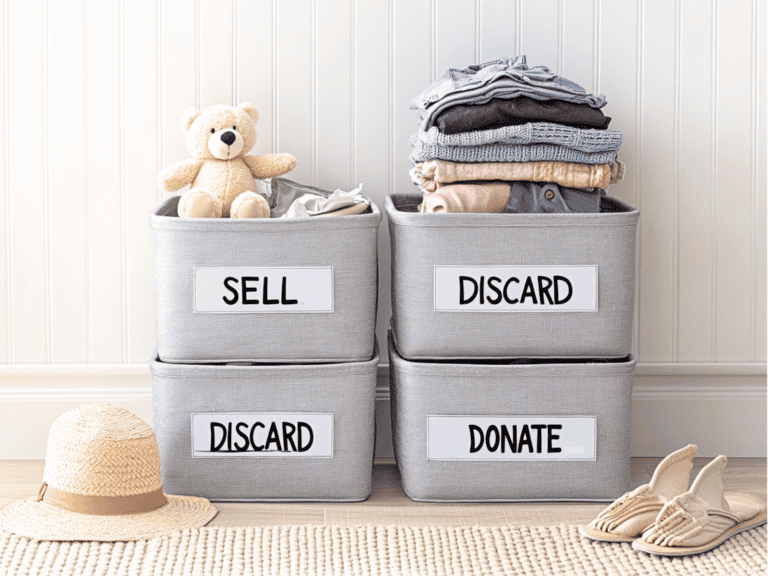35 Places To Sell Unwanted Items Online and In Person
Looking to turn your clutter into cash? Selling unwanted items is a smart solution whether you’re decluttering your home, downsizing, or just needing extra money. From popular online marketplaces to local selling spots, there are more ways than ever to find buyers for your unused stuff.
In this comprehensive guide, I’ll show you several proven places to sell your items online and in person. As a home organization expert, I’ve helped hundreds of clients successfully sell everything from clothing to collectibles. You’ll learn exactly where to sell different types of items, plus expert tips to get the best prices and avoid common selling pitfalls.

Before You Start Selling
Before listing your items, let’s cover some essential steps to help you sell faster and more profitably. A little preparation goes a long way in making your selling journey successful.
How to Determine Item Value
Start by researching your items’ worth to price them competitively:
- Search for similar items on eBay’s “Sold” listings
- Check current prices on Facebook Marketplace
- Compare prices across multiple platforms
- Consider item condition and age
- Look for any collectible or vintage value
Best Items to Sell for Profit
Focus on these high-demand categories first:
- Brand-name clothing and accessories
- Electronics and smartphones
- Video games and consoles
- Designer furniture
- Sports equipment
- Collectibles and vintage items
- Tools and equipment
- Baby gear and toys
Pro Tip: Items with original packaging or tags typically sell for higher prices.
Photography Tips for Online Listings
Good photos dramatically increase your chances of making a sale:
- Use natural lighting when possible
- Take photos against a clean background
- Capture multiple angles
- Show any flaws or damage, honestly
- Include size reference when helpful
- Focus on important details
- Avoid using flash (creates harsh shadows)
Pricing Strategies
Price your items to sell while maximizing profit:
- Start about 20% higher than your minimum acceptable price
- Research competitor pricing
- Consider platform fees in your pricing
- Factor in shipping costs if applicable
- Bundle similar items for quicker sales
- Be prepared to negotiate
Safety Considerations
Protect yourself when selling:
- Meet buyers in public places for in-person sales
- Use well-lit, monitored locations like police station parking lots
- Accept secure payment methods only
- Never share personal financial information
- Trust your instincts if something feels off
- Keep records of all transactions
- Use tracked shipping for online sales
Pro Tip: Many police stations have designated “Safe Exchange Zones” specifically for buying and selling items. These areas are usually monitored by security cameras and make excellent meeting spots.

Online Platforms
The digital world offers endless opportunities to find buyers for your items. Let’s explore the most popular and effective online platforms where you can start selling today.
1. Facebook Marketplace
Best for: Local furniture and household items
Key features:
- Built-in local buyer network
- Cross-posting to buy/sell groups
- Free listings with the option to boost
Pro Tip: List in relevant Facebook groups along with Marketplace to double your visibility.
2. Craigslist
Best for: Furniture, appliances, and local pickup items
Key features:
- Free listings
- Direct buyer communication
- Great for bulky items
Pro Tip: Always meet in public places and accept cash only for Craigslist transactions.
3. eBay
Best for: Collectibles, electronics, and specialty items
Key features:
- Auction and fixed-price options
- Secure payment processing
- Detailed seller protections
Note: Consider fees (insertion and final value) when pricing items on eBay.
4. Mercari
Best for: Smaller items, fashion, and collectibles
Key features:
- Lower fees than eBay
- Protected shipping labels
- Simple listing process
Pro Tip: Offer free shipping to attract more buyers – including the cost in your item price.
5. Poshmark (Fashion)
Best for: Designer clothing, shoes, and accessories
Key features:
- Social selling platform
- Active community of fashion lovers
- Easy shipping with pre-paid labels
Pro Tip: Share your listings daily and follow other sellers to increase visibility.
6. ThredUp (Clothing)
Best for: Name-brand clothing in good condition
Key features:
- They handle all photography and listing
- Send in clothes via Clean Out Kit
- Great for bulk clothing sales
Note: Payouts are lower, but it’s hands-off selling.
7. Depop (Vintage/Trendy)
Best for: Vintage clothing and trendy items
Key features:
- Popular with younger buyers
- Strong vintage community
- Great for unique pieces
Pro Tip: Use trending hashtags and style your photos like fashion magazines.
8. Etsy (Handmade/Vintage)
Best for: Vintage items (20+ years old) and crafts
Key features:
- Dedicated vintage buyers
- Higher price points
- Professional selling platform
Remember: Items must be truly vintage or handmade to qualify.
9. Decluttr (Electronics)
Best for: Phones, tablets, games, and tech
Key features:
- Instant price quotes
- Free shipping labels
- Quick payment
Pro Tip: Compare their quote to other platforms before committing.
10. BookScouter (Books)
Best for: Textbooks and valuable books
Key features:
- Free shipping is usually included
- Quick payment processing
- Great for textbooks
Note: Focus on textbooks and specialty books for best returns.
11. Reverb (Musical Instruments)
Best for: Instruments and music gear
Key features:
- Protected payments
- Shipping support
- Fair market prices
Pro Tip: Include detailed photos of any wear or damage.
12. GOAT (Sneakers)
Best for: High-end and collectible sneakers
Key features:
- Authentication service
- Premium buyer market
- Secure transactions
Note: All shoes must pass authentication before the sale is completed.
13. Bookoo (Furniture)
Best for: Local furniture sales
Key features:
- Community-based platform
- No shipping required
- Free listings
Pro Tip: Great alternative to Facebook Marketplace for furniture.
14. Chairish (Antiques/Designer Furniture)
Best for: High-end furniture and decor
Key features:
- Higher price points
- Professional audience
- Shipping support available
Remember: Items must meet quality standards to be accepted.
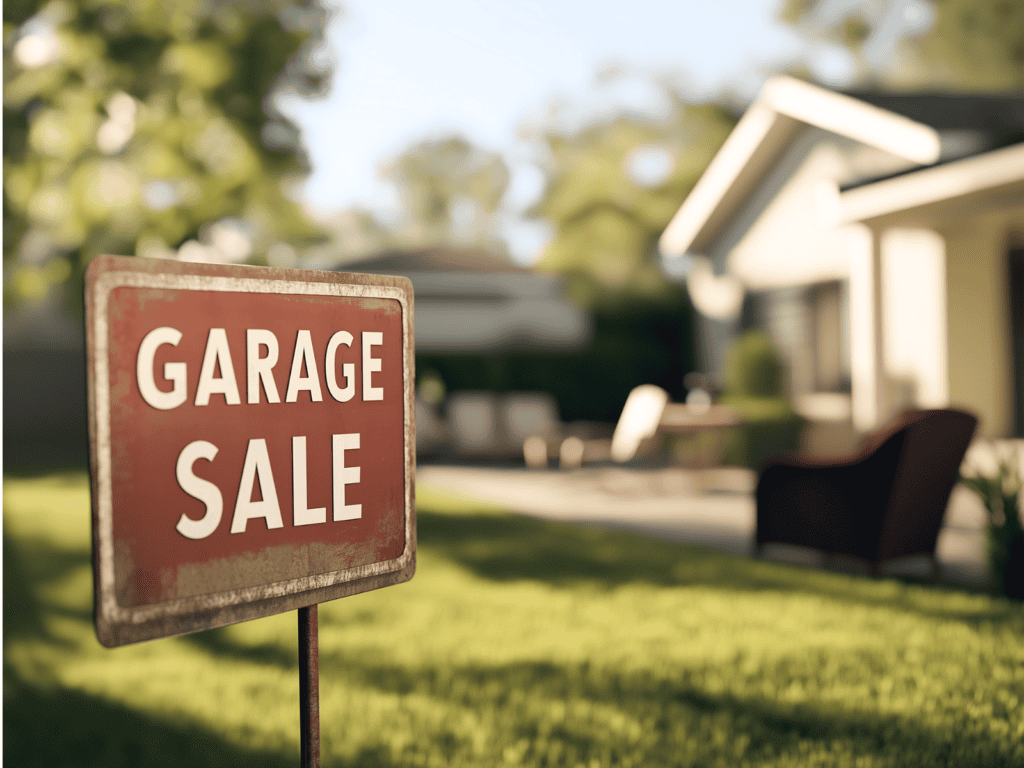
Local Selling Options
Sometimes the fastest way to sell your items is right in your local community. Local selling eliminates shipping hassles and lets buyers see items in person before purchasing.
15. Consignment Shops
Best for: Quality clothing, furniture, and accessories
Key features:
- No upfront fees
- Items usually sell within 90 days
- Split profit with store (typically 40-60%)
Pro Tip: Research different shops’ policies and commission rates before choosing one.
16. Pawn Shops
Best for: Electronics, jewelry, and musical instruments
Key features:
- Immediate cash payment
- No waiting for buyers
- Quick and simple process
Note: Expect to receive 30-60% of the item’s retail value.
17. Used Bookstores
Best for: Books, textbooks, and media
Key features:
- No shipping required
- Some offer store credit
- Higher value for popular titles
Pro Tip: Store credit usually offers better value than cash.
18. Record Stores
Best for: Vinyl records, CDs, and music memorabilia
Key features:
- Fair pricing for collectibles
- Quick transactions
- Cash or store credit options
Remember: Condition is crucial for value.
19. Video Game Stores
Best for: Games, consoles, and gaming accessories
Key features:
- Immediate payment
- Trade-in options
- Accept retro and current games
Pro Tip: Compare prices at different stores before selling.
20. Antique Dealers
Best for: Vintage items and collectibles
Key features:
- Expert evaluation
- Knowledge of market value
- Good for unique pieces
21. Yard/Garage Sales
Best for: Multiple items, household goods
Key features:
- Low overhead costs
- Sell many items quickly
- Great for furniture
Pro Tip: Host sales on weekends, especially the first of the month.
22. Flea Markets
Best for: Collectibles, antiques, and unique items
Key features:
- Regular customer base
- Multiple selling days
- Space to display items
Note: Consider booth rental fees in your pricing.
23. Local Auctions
Best for: Antiques, estates, and valuable items
Key features:
- Professional auctioneers
- Competitive bidding
- Marketing included
- Large buyer pool
- Good for entire estates
Remember: Auction houses take a commission.
24. Community Sale Events
Best for: General household items
Key features:
- Organized advertising
- High buyer traffic
- Set dates and times
Pro Tip: Sign up early for prime selling spots.
25. Swap Meets
Best for: Various items, especially collectibles
Key features:
- Regular events
- Dedicated buyers
- Community atmosphere
26. Local Buy/Sell Groups
Best for: Any items, especially family-related
Key features:
- Targeted audience
- No fees typically
- Quick transactions
Pro Tip: Join multiple groups for different types of items.
27. Once Upon a Child
Best for: Children’s clothing, toys, and gear
Key features:
- Immediate cash payment
- No appointment needed
- Multiple locations nationwide
Pro Tip: Items must be clean, current (within the past 5 years), and free from recall issues. For best results, bring items during their frequent buying days.

Mobile Apps and Quick-Sale Platforms
Mobile apps make selling easier than ever. These platforms combine the convenience of your smartphone with local and national selling opportunities.
28. OfferUp
Best for: Local furniture and household items
Key features:
- Easy-to-use mobile interface
- Free listings
- Both local and shipping options
Pro Tip: Verify buyers through their ratings before meeting.
29. Letgo
Best for: Quick local sales
Key features:
- Photo-based listings
- Location-based searching
- Free to use
Note: Recently merged with OfferUp but still maintains a separate user base.
30. VarageSale
Best for: Community-based selling
Key features:
- Local focus
- Group moderators
- Safe selling community
Pro Tip: Join multiple community groups to increase visibility.
31. 5miles
Best for: Local buying and selling
Key features:
- Five-mile radius focus
- Identity verification
- Free listings
32. Nextdoor
Best for: Neighborhood sales
Key features:
- Local focus
- Free to use
- Great for furniture
Remember: Keep communications within the app.
33. Shopify
Best for: Creating your own online store
Key features:
- Multiple payment options
- Inventory management
- Marketing tools
Note: Best for serious sellers with multiple items.
34. The RealReal
Best for: Luxury items
Key features:
- Authentication guaranteed
- Higher-end market
- Consignment model
35. Close5
Best for: Local community sales
Key features:
- Easy listing process
- Location-based
- In-app messaging
Tips for Successful Selling
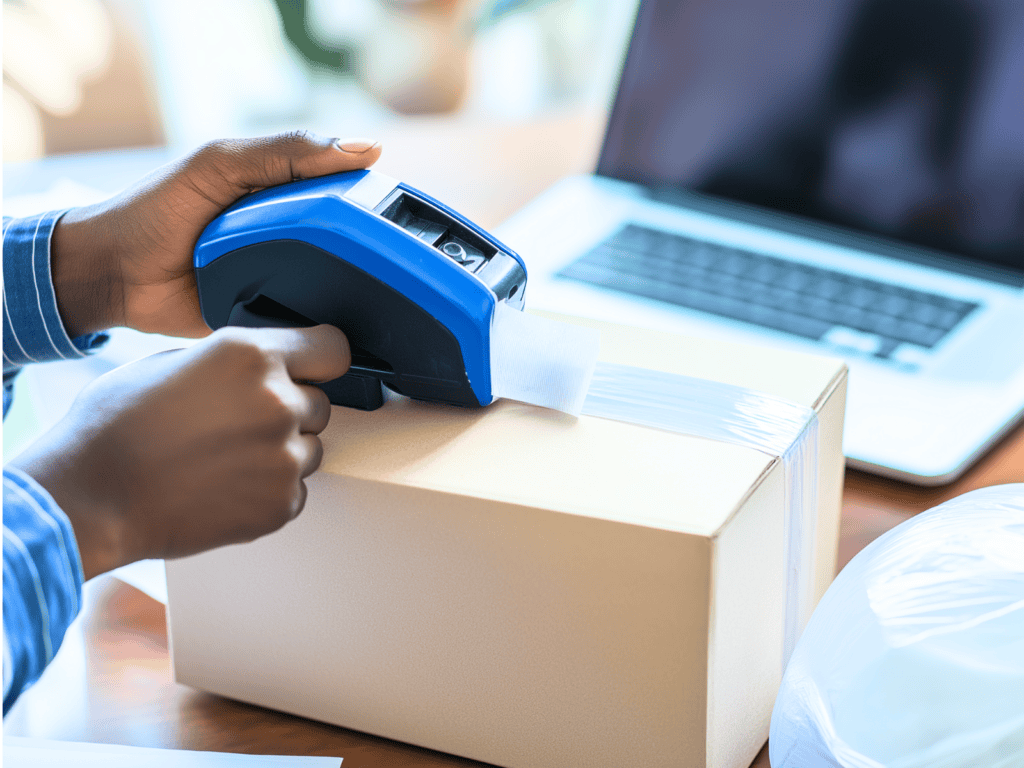
Online Selling Success
Writing Effective Descriptions
- Use clear, detailed titles
- List key features first
- Include measurements
- Mention brand names
- Describe any flaws, honestly
- Use relevant keywords
- State your policies clearly
Pro Tip: Use AI tools like ChatGPT or Claude to help write compelling product descriptions. Simply input your item’s basic details, and these AI assistants can help create professional, keyword-rich descriptions that attract buyers.
Responding to Buyers
- Reply promptly (within 24 hours)
- Be professional and friendly
- Answer questions completely
- Stay firm on scam requests
- Keep communication on-platform
- Be clear about policies
- Thank buyers after purchase
Shipping Tips
- Use appropriate packaging
- Calculate weight accurately
- Include handling costs
- Insure valuable items
- Ship promptly
- Provide tracking numbers
- Consider free shipping for higher prices
In-Person Selling Success
Negotiation Strategies
- Start with a reasonable but higher price
- Let buyers make the first offer
- Counter with specific amounts, not ranges
- Bundle items for better deals
- Know your bottom line
- Stay friendly but firm
- Be prepared to walk away
Cash Handling
- Bring exact change
- Check bills for authenticity
- Use calculator apps
- Don’t accept checks
- Consider digital payments
- Keep money separate
- Count money visibly
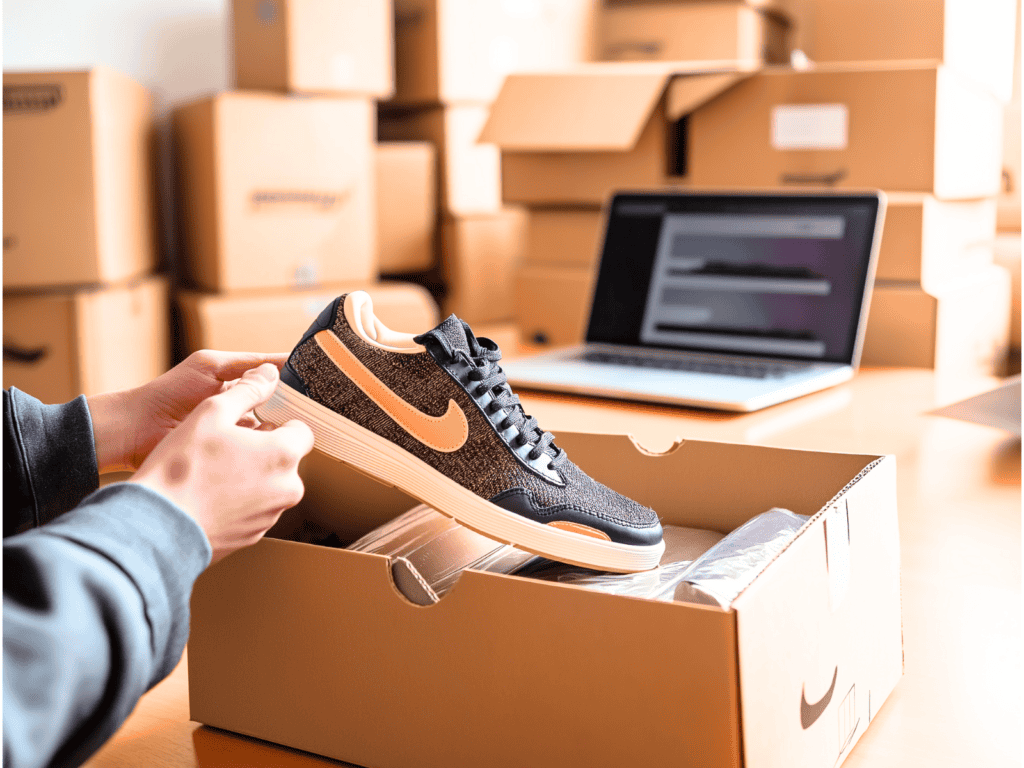
What to Do When Items Don’t Sell
Sometimes items don’t sell right away. Don’t get discouraged – try these strategies to donate stuff instead.
Donation Options
- Local charities
- Thrift stores
- Religious organizations
- Schools and daycares
- Women’s shelters
- Animal shelters (for blankets/towels)
- Buy Nothing groups
Price Adjustments
- Reduce by 10-15% every week
- Compare to similar listings
- Bundle with other items
- Offer special deals
- Consider seasonal pricing
- Add extras or incentives
- Calculate your bottom line
Alternative Platforms
- Try different selling apps
- Switch to local from online
- Consider consignment
- Explore specialty markets
- Use social media
Timing Considerations
- List seasonal items early
- Post during peak hours
- Consider payday weekends
- Watch market trends
- Note holiday seasons
- Time big-ticket items with tax returns
- Refresh listings regularly
Pro Tip: The best time to list items is usually Thursday evening through Saturday morning when most buyers browse.
Frequently Asked Questions

How can I sell items quickly?
- Price items 10-20% below market value
- Take quality photos
- Write detailed descriptions
- Respond to inquiries promptly
- List during peak times
- Share on social media
- Consider local pickup options
Is it better to sell online or in person?
It depends on your items and situation:
Online Benefits:
- Larger buyer pool
- Often better prices
- Convenient from home
- Protected transactions
In-Person Benefits:
- No shipping hassle
- Immediate payment
- No platform fees
- No return issues
What are the safest payment methods?
Recommended:
- Cash (for in-person)
- PayPal
- Venmo
Avoid:
- Personal checks
- Wire transfers
- Gift cards
- Cryptocurrency
How can I avoid scams when selling?
- Never ship before payment clears
- Avoid off-platform transactions
- Watch for fake payment emails
- Don’t accept overpayments
- Meet in safe, public places
- Trust your instincts
- Report suspicious activity
What items sell best online vs. in person?
Online Best-Sellers:
- Designer clothing
- Collectibles
- Electronics
- Specialty items
- Brand-name goods
In-Person Best-Sellers:
- Furniture
- Large items
- Local interest items
- Heavy items
- Low-value bulk items
How do I handle shipping and returns?
Shipping Tips:
- Use calculated shipping
- Pack items securely
- Get tracking numbers
- Insure valuable items
- Take photos before shipping
Return Policy Tips:
- State policies clearly
- Consider platform requirements
- Document item condition
- Keep shipping receipts
- Be professional with issues
Pro Tip: Build shipping costs into your price and offer “free shipping” to attract more buyers.
Additional Resources
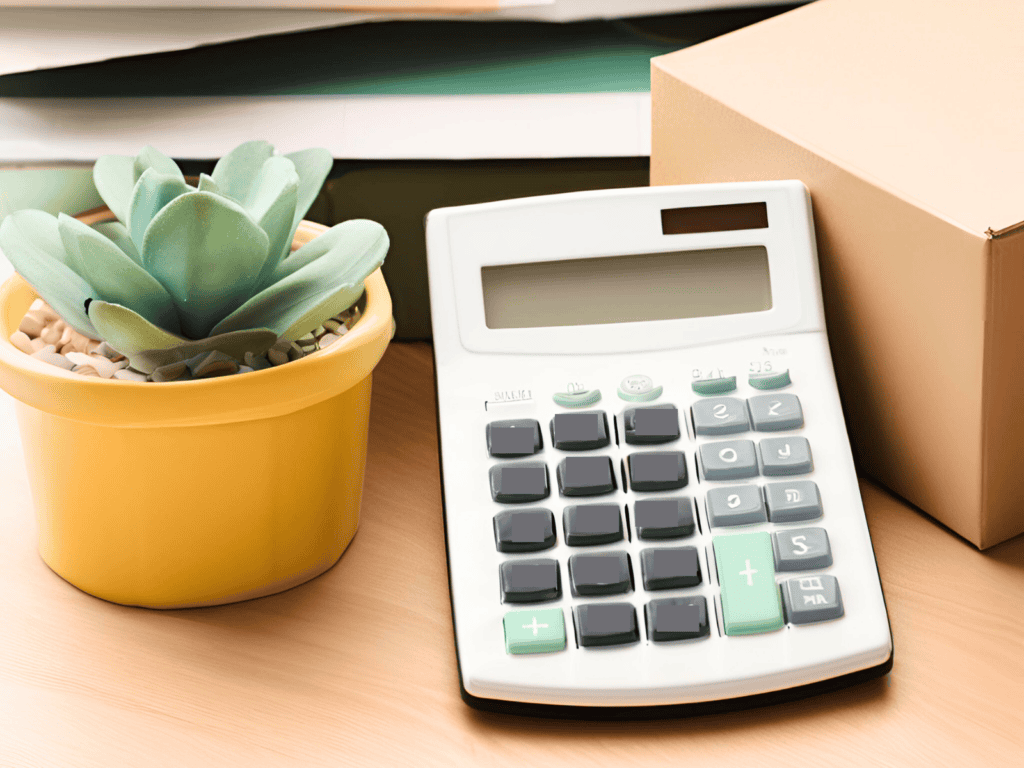
Fee Calculator
Quick reference for platform costs:
Selling price – platform fee – payment processing fee – shipping costs = your profit
Conclusion
Ready to transform your clutter into cash? Armed with these selling options and expert tips, you’re now prepared to start your selling journey successfully. Remember, the key to selling unwanted items is choosing the right platform for each item and maintaining a professional approach throughout the process. Start small, perhaps with one platform and a few items, then expand as you gain confidence and experience.
Whether you choose online marketplaces, local options, or specialty platforms, focus on clear photos, honest descriptions, and prompt communication with buyers. Every item you sell puts money in your pocket and creates a more organized, clutter-free living space. Take that first step today – pick one item, choose your platform, and start your selling success story.


